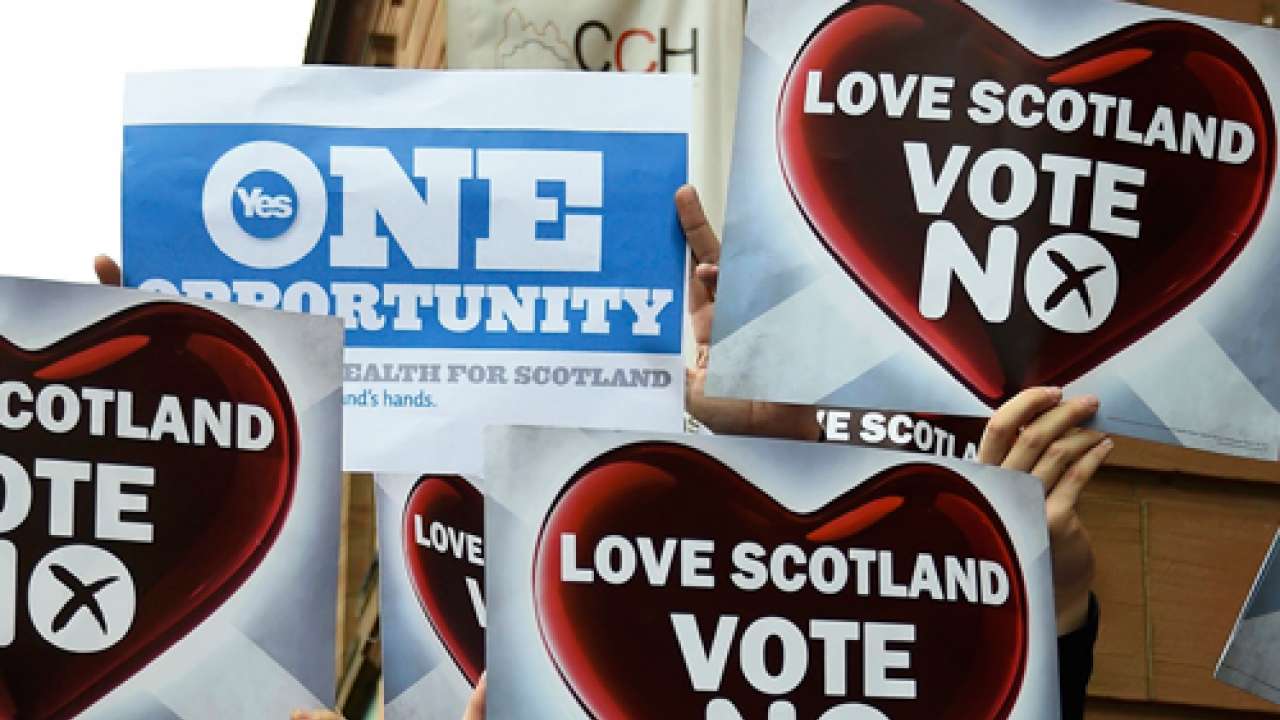
Scotland has chosen to stay in the United Kingdom, spurning independence in a historic referendum in which the country decided whether or not to end the 307-year union.
With 31 out of Scotland's 32 council areas having declared, the "No" side is leading with 55.42% of the votes against 44.58% of the votes in support of independence, according to the BBC. Scotland has seen a high voter turnout, with 84.48% of the population casting their ballots.
Latest updates
Spanish leaders relieved as Scottish 'no' deals blow to Catalan separatists
Spanish political leaders hailed Scotland's rejection of independence on Friday, a vote that dealt a blow to separatists in Spain's own northeastern region of Catalonia who have drawn inspiration from secessionist Scots. Despite an outcome in Scotland that was widely seen as a setback for the cause of Catalan independence, the region's separatist-led government was expected to announce plans later on Friday for a non-binding referendum, in defiance of Madrid.
Spanish Prime Minister Mariano Rajoy said Scots had "chosen the most favourable option for everyone; for themselves, for all of Britain and for the rest of Europe". "The Scottish have avoided serious economic, social and political consequences," he said. Read more
Cheers and tears from winners and losers in Scotland independence referendum
As Scotland's regions reported their decisions in a momentous independence referendum to the central counting operation in Edinburgh in the early hours of Friday morning, the "Yes" supporters' mood grew ever more deflated. The votes piled up in favour of staying with the United Kingdom. And when it became clear that the independence campaign's dream was not to be realised, there were grim faces and tears on their side and whoops and cheers from the unionists. Read more
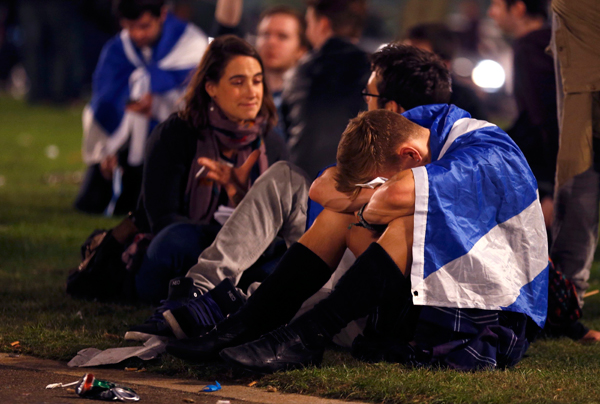
Scottish independence issue settled 'for a generation', says British PM David Cameron
British Prime Minister David Cameron said the issue of Scottish independence had been settled "for a generation" on Friday but pledged a swift constitutional shake-up after what he called "a clear vote" by Scots to stay part of the United Kingdom. Cameron, whose own job would have been on the line if Scots had voted in favour of independence, said his strategy to allow Scots a referendum had been the right thing to do from a democratic point of view and had been vindicated. Read more
Nationalist leader Alex Salmond concedes defeat, demands more Scottish powers fast
Scottish nationalist leader Alex Salmond conceded defeat on Friday over his bid to win independence and demanded the British government rapidly meet its promise of more powers for Edinburgh. "Scotland has by a majority decided not at this stage to become an independent country. I accept that verdict of the people," Salmond told independence supporters in the Scottish capital.
Leaders of Britain's three main parties, shocked by the strong showing of the independence campaign in recent weeks, scrambled to offer Scots more devolved powers if they remained part of the United Kingdom. "Scotland will expect these to be honoured in rapid course," Salmond said. Read more
"We have chosen unity over division, and positive change rather than needless separation," Alistair Darling, leader of the anti-independence campaign and Britain's former finance minister said. "Every political party must now listen to (the public's) cry for change which could be echoed in every part of our United Kingdom but had the opportunity to express itself first in Scotland."
Nigel Farage, leader of the anti-EU party, said, "I really do think now we absolutely need to have a constitutional covention to talk about how we create a fair, federal United Kingdom.". He added, "One of the big questions is, should England have a first minister? And if England has a first minister what does that mean for the authority of the prime minister of the United kingdom? I haven't got the answer to it. I don't think anyone has got the answer to it this morning."
Scots spurn independence, vote to stay in the United Kingdom
Scotland has chosen to stay in the United Kingdom, spurning independence in a historic referendum that had worried allies and investors, results showed on Friday with more than two thirds of the vote declared. Scotland's final verdict on the union should be clear within two hours. Supporters of the United Kingdom have won 54% of the vote, according to Reuters calculations, and that share could climb. Read more
Scotland votes against independence: BBC forecast
Scotland has voted against independence in a historic referendum, the BBC forecast on Friday after preliminary results showed 54.3% voting "No" and 45.7% voting "Yes". "The BBC forecasts that Scotland has voted against becoming an independent country," read a statement on its website. Read more
Partial results show that Scotland is voting to stay in the United Kingdom, with more than 60% of the votes declared. Reuters calculations based on the partial results showed Scottish support for staying in the UK on 54% versus 46% for declaring independence.
British PM Cameron lauds Scottish anti-independence campaign head
British Prime Minister David Cameron on Friday congratulated Alistair Darling, the man who spearheaded the campaign against Scottish independence, as partial results indicated Scotland had voted to stay in the
United Kingdom by a clear margin. "I've spoken to Alistair Darling and congratulated him on a well-fought campaign," Cameron, whose own job would have been on the line in the event of a "Yes" vote, wrote on his official Twitter feed. Cameron, who campaigned against Scottish independence along with the leaders of Britain's other two main political parties, is expected to make a televised statement welcoming the results of the referendum from his London offices at around 06.00 GMT.
Scottish nationalist leader Nicola Sturgeon says 'Yes' vote fell narrowly short
Nicola Sturgeon, one of the leaders of Scotland's independence campaign effectively conceded defeat on Friday after a historic referendum. "Like thousands of others across the country I've put my heart and soul into this campaign and there is a real sense of disappointment that we've fallen narrowly short of securing a yes vote," Sturgeon, deputy leader of the pro-independence Scottish National Party, told BBC Television, according to Reuters. With most regional results now declared, a Reuters calculations put support for staying in the United Kingdom at 54%. A final declaration is expected in the next hour or two.
British tennis star Andy Murray subjected to 'death wish' tweets after declaring support for Scottish independence
British number one Andy Murray was subjected to death wishes on Twitter after the tennis ace declared his support for Scottish independence. Murray announced his backing for Yes on Twitter, adding that he is excited to see the outcome. But he was soon subjected to a barrage of shocking hate-filled comments on the social media site. Read more
Scotland voter turnout could be UK's highest as almost 90% vote in most districts
Early figures on Friday indicated the turnout for Scotland's historic independence referendum could be the highest ever in the United Kingdom, for a vote that could break up the centuries-old union. Turnout in many voting districts was touching 90%, meaning turnout could break the previous record set in the general election of 1950. Read more
With 16 of 32 constituencies saying No, Scotland is voting against independence
Scotland has voted against breaking from the United Kingdom in half its constituencies home to nearly one third of the electorate, early results from a divisive independence referendum showed. Scotland's final verdict on the union should be clear around breakfast time on Friday. With 16 of 32 regions declared so far, the nationalists have only won two. According to Reuters calculations, the "No" camp has 56% of the vote although the biggest areas have yet to declare. Read more
Meanwhile, Glasgow, Scotland's largest city, has bucked trends to vote for independence from the United Kingdom, but only by a narrow margin, its counting officer said. The vote was split 53% in favour of independence, 47% against, not enough to buck the trend of results in other parts of the country. "It certainly isn't good enough given results elsewhere," John Curtice, a professor at Strathclyde University and a leading authority on polling, told the BBC.
Scots vote against independence in four small constituencies
Scotland voted against breaking apart the United Kingdom in four small constituencies, early referendum results showed on Friday, as Scots agonised over the fate of their country following a divisive independence campaign. Unionists won Clackmannanshire, the Orkney Islands, the Shetland Islands and even the nationalist stronghold of the Western Isles - constituencies which together represent only 2.3% of the Scottish electorate. Read more
Counting of votes begins as fate of UK hangs in balance
Excitement vied with apprehension as Scottish voters went to the polls Thursday in a referendum on independence, deciding whether to dissolve a 307-year union with England that brought prosperity but has increasingly felt stifling to many Scots. As the polls closed and the vote counting began, there was a quiet thrill of history in the making on the fog-shrouded streets of Scotland's capital, Edinburgh. Many Scots were staying up all night in homes and bars to watch the results roll in. Read more
Scots vote in record numbers, await independence verdict
Scots agonised over the fate of their country on Friday after record numbers voted in a divisive independence referendum that could break apart the United Kingdom. Scotland's verdict on the union should be clear around breakfast time on Friday, but a YouGov poll of 1,828 voters the organisation had previously polled indicated 54% of Scots would back the union while 46% would seek independence. Read more
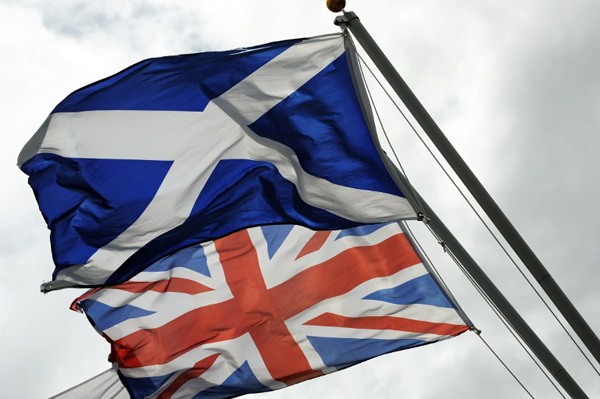
Image credit: AFP
Voters arrived at polling stations in schools and halls as soon as they opened at 6.00 am GMT on Thursday, following an intense final day of campaigning on Wednesday. The first person to cast a ballot in Edinburgh's Waverley Court was a businessman named as Ron. "This is a historic day for Scotland. I've waited all my life for this. It's time to break with England. 'Yes' to independence," he told Reuters after voting.
Scots are being asked a simple question: "Should Scotland be an independent country?", to which they have to only answer either Yes or No.
Also Read: As Scotland votes, United Kingdom's fate on knife edge
Supporters of keeping Scotland within the United Kingdom held a 6 percentage-point lead in a final independence opinion poll which was published as voters were taking part in the referendum on whether Scotland should break the 307-year-old union. The Ipsos Mori poll for the London Evening Standard newspaper put support for staying within the UK at 53%, with support for independence at 47%. It said 4% of Scots who were certain to vote were still undecided. Earlier, both the "Yes" and "No" campaigns were going neck and neck.
According to Reuters, the results of the referendum are expected "by breakfast time on Friday morning", electoral officials said.
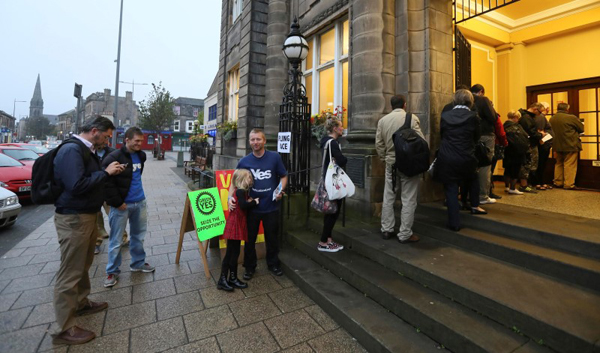
Image credit: Reuters
Newspapers marked historic referendum day with flags of UK, Scotland; quote poet Robert Burns
With special front pages featuring flags and quotes from poet Robert Burns, Scottish and English newspapers caught the drama and sense of history surrounding Scotland's independence referendum on Thursday. Most had cleared all other news from the front page. Read more
British tennis star Andy Murray backs Scottish independence
British tennis star Andy Murray has come out in support of Scottish independence on Thursday, just hours before millions of his fellow Scots voted in a referendum on whether to end the 307-year union with England. Murray, who has no vote himself as he lives near London, had previously refused to be drawn one way or the other on whether he backed secession, but his previous remarks on the issue had suggested he supported the union. "Huge day for Scotland today! no campaign negativity last few days totally swayed my view on it. excited to see the outcome. lets do this!" he wrote on his Twitter feed. Read more
Scotland's independence referendum stirs Kashmiri demands for vote on future
Kashmiri separatist leaders have seized on Scotland's referendum on independence to demand that India follow through on a promise to grant a similar vote in the disputed Himalayan region. Kashmiri separatist leader Mirwaiz Umar Farooq said Scotland's referendum was an example of how Kashmiris' demands for a say on their future could be solved peacefully. "We hope India will also change its approach and realise the fact that people's rights can't be trampled upon," Farooq said. "It is encouraging that in a peaceful manner people will be deciding their future." Read more
Also Read:
* From JK Rowling to Sir Alex Ferguson's views, 9 things you need to know about Scotland's independence referendum
Who all can vote? Virtually almost everyone above the age of 16 years currently living in Scotland can vote in this historic referendum. According to electoralcommission.org.uk, British or Irish citizens or European Union (EU) citizens living in Scotland and a qualifying Commonwealth citizen living in the country can have their say in the referendum. People can cast their vote in person, by post or even by proxy. i.e. by nominating someone to vote for him/her. However, all Scottish people living elsewhere in the United Kingdom or in other countries are not eligible to vote in this referendum. That means, according to some estimates, 800,000 Scots who live in other parts of the UK don't get a vote, while the 400,000 people from elsewhere in Britain who live in Scotland cast their opinion. It may well turn out to be a gamechanger in the end. Read more
* 7 separatist movements that are closely watching Scotland's independence referendum
The Scottish independence referendum comes at a time when the world is witnessing much strife from anti-government protests and the ensuing crises in several countries. There has been an ongoing wave of violence in Syria, Iraq, Ukraine, Palestine-Gaza, Libya and other parts of Africa, what the Pope recently referred to as a 'piecemeal World War III'. Amidst fears that the referendum could cause a domino effect, nationalist and separatist movements around the world are keeping a close eye on the ongoing events in Scotland. We take a look at seven such movements, including Catalonia, Venice and Kurdistan. Read more
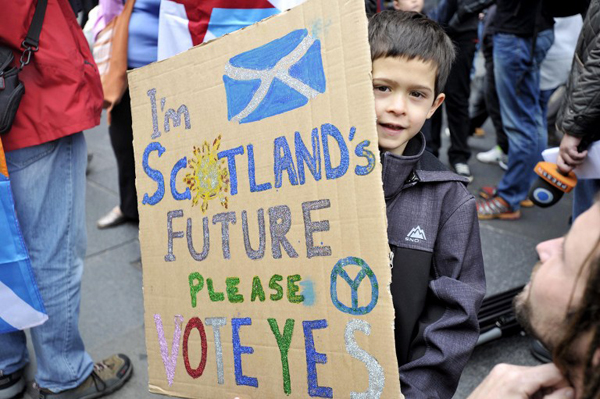
Image credit: AFP
Background:
Scotland, a country of a little over 5 million people, forms the northern one third of the island of Great Britain and has been part of the United Kingdom for the last 307 years. Before joining the UK in 1707, it was an independent sovereign state for over 800 years since it became a single nation in the 9th century.
When did Scotland merge with Britain?
When England went to war with France in the early 18th century, fears that Scotland would side with the enemy prompted London to block trade and deprive the Scots of property they owned south of the border, unless they agreed to create a single country. After much debate — and widespread Scottish hostility — both the Scottish and English parliaments were dissolved on May 1, 1707 and replaced with a new British parliament.
How is Scotland different from the rest of the United Kingdom?
Scotland has its own legal system, and the national Church of Scotland was guaranteed under the Act of Union. However, all monetary and finance matters are controlled by the government in London and the Bank of England, which was founded by Scotsman William Paterson in 1694.
Doesn't Scotland already have its own parliament?
A desire for more autonomy in Scotland led to Westminster holding a referendum in 1997 for the establishment of a devolved Scottish Parliament in Edinburgh. The idea was backed by 74.3% of the voters. In 1999, the parliament was opened for business by veteran politician Winnie Ewing, who chaired the first meeting, with the words: "The Scottish Parliament adjourned on the 25th day of March in the year 1707 is hereby reconvened."
What can the Scottish Parliament do?
Members of the Scottish Parliament can legislate on education, health spending, housing, tourism, transport and a few other areas; they have no control over immigration, defence, foreign policy, employment, trade, energy or the main levers of finance. Most of the money used by the Scottish Parliament to finance public services comes from a grant allocated by the United Kingdom government.
What are Scotland's economic strengths?
The UK produces more than 75% of the European Union's offshore oil production, of which 90% is extracted from Scottish waters, according to the European Commission's Joint Research Centre. Based on 2012 figures, the Scottish government says this Scottish oil contributes around £24.4 billion ($39.5 billion) to the UK economy.
What else?
In addition to oil, the Scottish government calculates the country could produce 25% of the EU's offshore wind and tidal energy and 10% of the EU's wave energy. Scottish exports are worth around £100 billion year to the British Treasury, including more than £11 billion from financial services, along with almost £9 billion from food and drink, including whisky. Read more
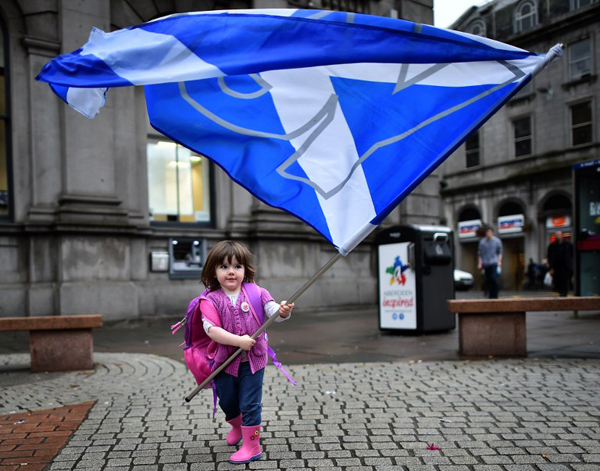
Image credit: AFP
Also Read:
* Is Scotland just a step away from ending 307-year union with the UK?
For those who believe that the European project is over and a success, the Scottish independence referendum and the 1.8 million man march for Catalonian freedom in Barcelona last week should serve as a rude wake-up call. Even as the intellectual descendants of Jean Monnet (one of the fathers of the European Union) seek to make their Union more perfect, fissiparous tendencies persist in pockets. Europe has dozens of separatist groups and though few of them are of concern, many have a long history. The strength of the Scottish independence movement has caught many by surprise. If polls are to be believed, the referendum, to be held on September 18, may just result in the re-emergence of the Scottish nation after 307 years of English rule. Those old enough, however, will remember that this is no bolt from the blue. Read more
* Scotland independence referendum: Why breaking up UK could tear apart the EU, too
While recent opinion polls have swung slightly back toward the "no" camp, there remains a distinct possibility that Thursday's Scottish referendum will trigger a previously unthinkable breakup of Britain. If this were to happen, the biggest risks for global businesses and investors do not lie in the economic problems created by Scotland's choice of currency or the inevitable arguments about sharing North Sea oil revenue and the British national debt. These are crucial challenges for Scotland and have been much discussed in financial institutions and think tanks. But the crucial issue for the world economy and financial markets is about the resulting impact on the European Union -- and especially on Britain, which would remain the world's sixth largest economy even if Scotland departs. Read more
* Scotland can expect one heckuva hangover after independence vote - yes or no
Scotland will soon be suffering from a monumental hangover. There will be a lot of hurt heads, a lot of tears and, without a doubt, an immense amount of anger that will last who knows how long - weeks, months, maybe even years - if Alex Salmond's dream of independence comes true. The referendum on independence is quite unlike any other United Kingdom election I have witnessed. It is much more visceral, with so many complicated currents swirling beneath one simple question: Is Scotland in Britain or out of it? There are a lot of people going with their gut instinct, and you sense that if the outcome goes against them, the simmering rage will finally bubble over. Rioting in the streets? Perhaps. Read more